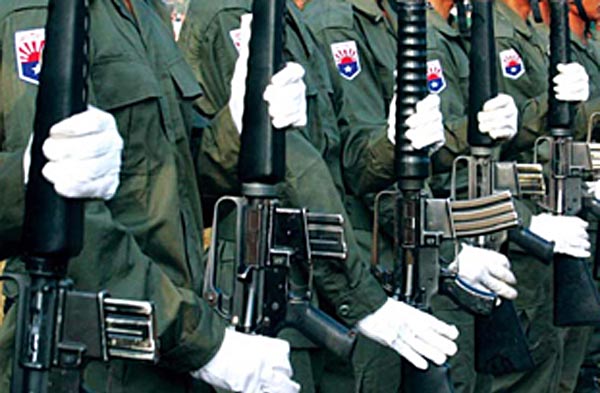More than 40 Karen organisations based overseas have released a statement expressing a lack of confidence in the Burmese peace process after it emerged that no more than eight armed groups – three of which are ethnic Karen – will be signing the agreement.
The statement, signed by 41 Karen community groups in the United States, Canada, Australia, Europe, Thailand and Malaysia, said actors in the ongoing ceasefire talks have “failed miserably” to: build trust between ethnic armed groups and the government, or among themselves; ensure the ceasefire accord encompasses all ethnic militias; stop the Burmese army’s offenses and militarisation in ethnic regions; create trust and confidence among the Karen people or other ethnic peoples.
The groups urged leaders of the Karen National Union (KNU) and other would-be signatories to the accord to “seriously consider” the call for the inclusiveness of all armed groups in the nationwide ceasefire agreement (NCA) which is due to be signed in Naypyidaw on 15 October.
“We envisioned that the nationwide ceasefire would truly cover the whole country. With only eight groups signing, it will never really be the case, which is why we have expressed no confidence in the negotiations,” said Saw Orlando, national vice president of the Australian Karen Organisation Inc.
[related]
He accused the KNU’s current leadership of breaking from a vision the group had maintained for 60 years – that of unifying all the country’s armed groups into a coalition “that would ensure victory in their struggle”.
A summit by ethnic armed groups at the end of September in Chiang Mai resulted in just seven out of 19 participants pledging to sign the NCA. The Restoration Council of Shan State (commonly known as the Shan State Army-South) on Sunday became the eighth armed group to join the accord.
Among those who have opted out is the Kachin Independence Organisation, which boasts an army of some 7,000 fighters. In an interview with DVB on Monday, its leader Gen. Gun Maw confirmed that one of the main stumbling blocks was the government’s refusal to include the Kokang, Arakan and Palaung (Ta-ang) militias in the process.
The Burmese government delegation maintains that the three rebel groups in question cannot be signatories to the NCA while they are engaged in conflict with government forces in the northeast of the country.
Read more about Burma’s derailed peace process



